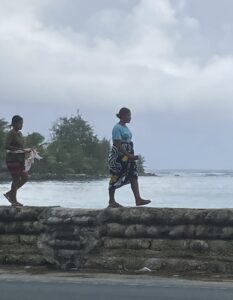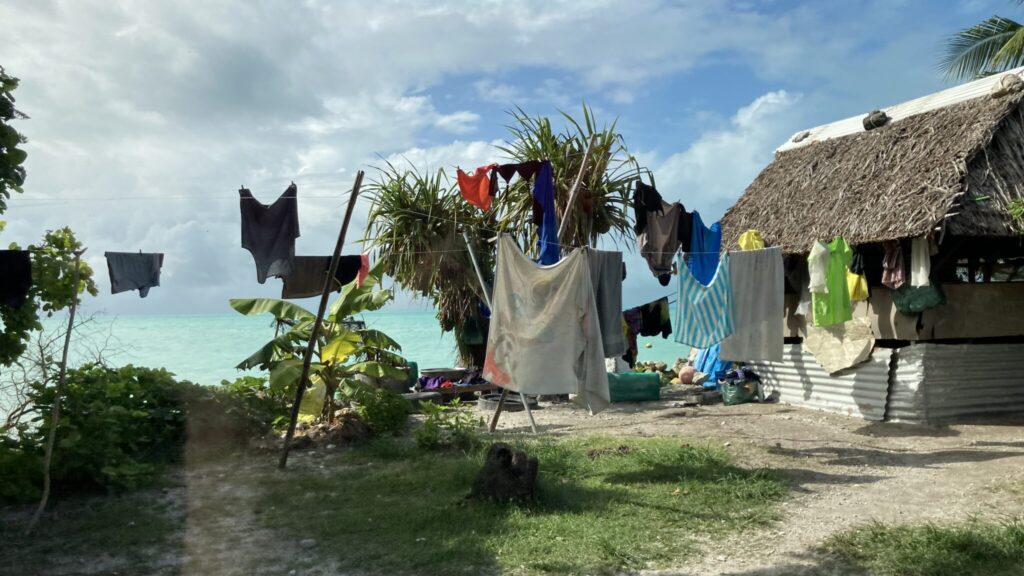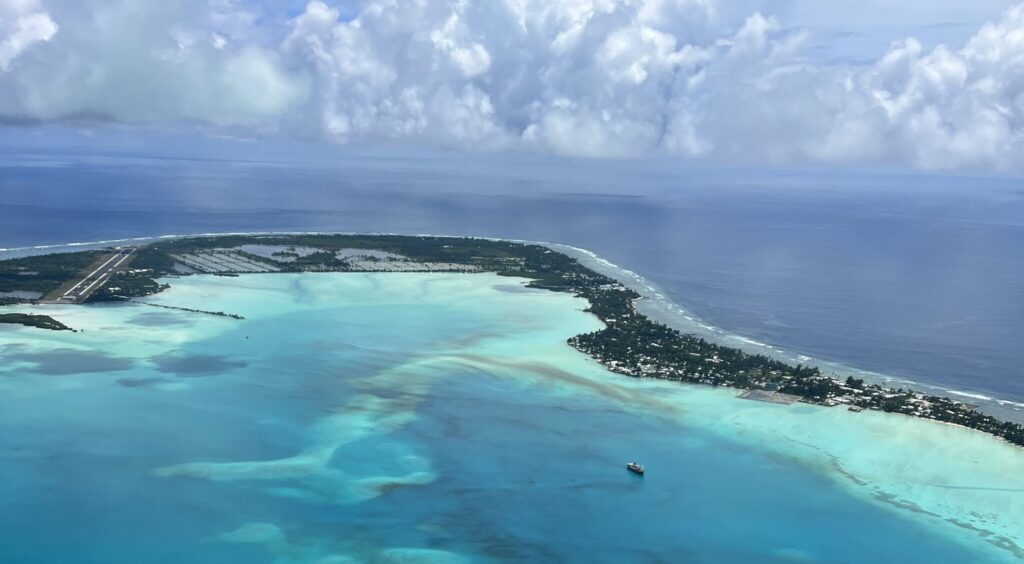When Good Samaritan Sister Michelle Reid visited the Pacific nation of Kiribati last month, she was immediately struck by two things – the vulnerability of the land due to rising sea levels and the wonderful ministry being done by the Sisters of the Good Samaritan in the local community.
By Debra Vermeer
Michelle is a member of the Good Samaritan Council and has pastoral responsibility for Kiribati. Her visit was aimed primarily at spending time with the Sisters and seeing first hand their ministries.
“The reality of life in Kiribati wasn’t a shock, even though it was my first time there,” she said. “The poverty and the conditions weren’t distressing to me because I’ve worked previously in Timor Leste and the Philippines.
“But I was really struck by the vulnerability of the land. You can stand in most places and look to the left and see the ocean, and to the right and see the lagoon. That’s how narrow the strip of land is and you comprehend just how vulnerable they are.”
Despite that vulnerability and the leading voice of former Kiribati President Anote Tong in the global climate change debate, Michelle said she found it was not a prominent point of conversation among the people she encountered, who were focused on their day-to-day lives.
“I was there to learn and to see the Sisters in their ministries and hear about what’s happening in their lives,” she said. “I wanted just to spend time with them and build up trust and the start of a relationship. And I was so impressed. The Sisters are busy doing wonderful ministries.”
The Sisters of the Good Samaritan have had a presence in Kiribati for more than 30 years, and today there are two communities of Sisters, one in Abaokoro and the other at Temaiku.
They are engaged in a variety of educational, pastoral and community development ministries. These include running the Good Samaritan Early Childhood Learning Centre, teaching English at the local primary school, and catechetics, visiting the elderly, engaging in Lectio Divina in their ministries, providing cultural preparation for people getting ready to take up seasonal work in Australia, offering pastoral care to patients at the psychiatric hospital and those in prison, and supporting people with physical and intellectual disabilities.
The Sisters also remain active in the Kiribati Pastoral Institute (KPI), a diocesan pastoral institute, which offers a two-year course for young leaders.
Religious vocations from Kiribati have also been rich over the years. There are currently eight I-Kiribati sisters and one novice who is studying in Australia, along with a number of inquirers who are exploring their interest in Good Samaritan life.

Image credit: Sister Michelle Reid SGS.
Sister Kawi Arebonto SGS, who teaches at a school for children with disability, said it was a joy for the Sisters to welcome Michelle and to be able to show her their country, their lives and their ministries.
“We enjoyed having Michelle with us here in both communities (Abaokoro and Temaiku),” Kawi said.
“She joined a lot of our ministries and when she visited me and my students at the school, she had time to talk, play with the students and speak with my colleagues. She also went around the compound and interacted with staff and students.
“Michelle also joined our Faith and Light prayer group for people with disabilities, visited some elderly people with Sister Taabeia Ibouri SGS, visited and prayed with people with mental illness, and went with Sister Kakare Biita SGS and our Good Samaritan inquirers to visit and pray with the prisoners.
“We are grateful for her visitation and enjoyed being with her.”
Michelle said while the Sisters face many logistical challenges, including having had no power in Abaokoro for many months, they bear with these difficulties patiently.
“The inspirational thing is to see them in their ministries,” she said.
“To see Kawi and her colleagues working in the school for children with disabilities, most of whom are non-mobile and non-verbal, was really beautiful. The care and the tender way they interact with the children was very inspirational.”
Michelle said another “very moving experience” was visiting a prison with Sister Juniko Toaua SGS.
Juniko regularly meets with prisoners, some of whom have served their initial sentence but are awaiting release, and she holds Lectio Divina with them. Juniko is also completing further studies.
Sister Ameria Etuare SGS said she enjoyed sharing with Michelle about her current ministry as a lecturer at the Kiribati Teachers’ College (KTC).
“KTC has been under the Ministry of Education, one of the Kiribati Government’s ministries. I have been away since 2021 undergoing further studies to upgrade my qualification. My main role at KTC is to plan, prepare, and teach the pre-service teachers for their future teaching careers,” Ameria said.
“Since teaching is my passion, I believe that I am embracing all the challenges and struggles during teaching life. Mingling with students every day is a joy and life giving for me.”
Michelle said some of the Sisters were completing various studies to assist them in their ministry.

Image credit: Sister Michelle Reid SGS.
Ameria achieved her Master’s in Education through coursework and has since had the opportunity to do a full-time thesis as a pathway to becoming a PhD student, looking at the question of whether aid donors donate according to their own priorities rather than the needs of the local people.
Taabeia is studying Community Development to assist in her ministry with seasonal workers, many of whom go from Kiribati to Australia, seeking a better economic future.
She is a member of ACRATH (Australian Catholic Religious Against Trafficking in Humans) and is working with ACRATH and the Australian Catholic Migrant and Refugee Office on a joint project raising awareness of the pastoral care needs of seasonal workers with parishes and other stakeholders.
During her visit, Michelle also accompanied Kakare to a Mass at the Our Lady of the Sacred Heart Sisters’ precinct where the original convent for the Sisters of the Good Samaritan was located.
“I was struck by how those original Sisters who came from Australia to Kiribati had set up many of these ministries that are continuing today,” she said.
“I had this realisation that all the Sisters, bar one, who had lived in Kiribati over the years are still alive and that the current Sisters are building on the shoulders of those Sisters. I emailed those Sisters and told them that the Sisters in Kiribati now still talk about them and remember them.
“The whole visit was a privilege for me and an opportunity to see the Sisters in Kiribati grow into that legacy and to be witness to it and to continue to build on it in their ministries of being neighbour.”
The ministries of the Sisters are supported by the Good Samaritan Foundation. Donations over $2 are tax deductible in Australia and can be made via the website.

Image credit: Sister Catherine McCahill SGS.
